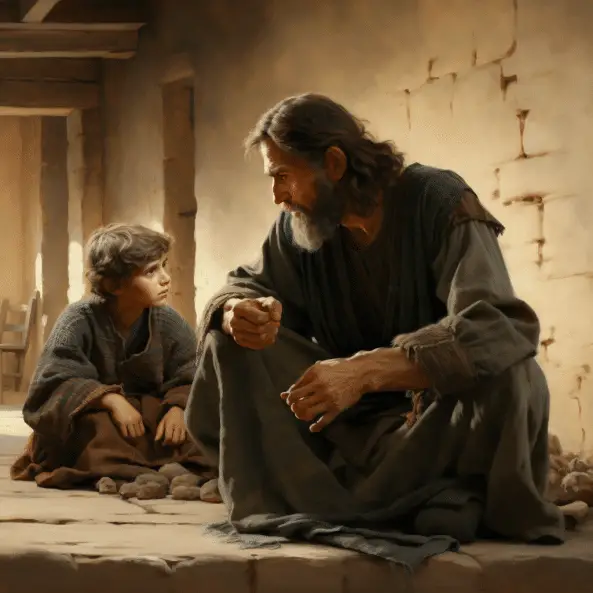
Prodigal Son and Fruits of the Spirit: The Bible verse Galatians 5:22-23 holds great meaning when examined alongside the parable of the Prodigal Son found in Luke 15:11-32. This powerful story, often referred to as one of the most beloved parables in scripture, teaches profound lessons about forgiveness, grace, and the unwavering love of a father.

Key Takeaways:
- The parable of the Prodigal Son showcases the transformative power of repentance and forgiveness.
- Galatians 5:22-23 highlights the fruits of the Spirit, such as love, joy, peace, patience, kindness, goodness, faithfulness, gentleness, and self-control.
- The Prodigal Son’s journey serves as a reminder of the importance of humility and recognizing our own mistakes.
- The father’s unconditional love and forgiveness exemplify the divine love and grace that Christians strive to emulate.
- By studying the Prodigal Son and Galatians 5:22-23, we can deepen our understanding of the Christian faith and apply its teachings in our daily lives.
Understanding Galatians 5:22-23
Galatians 5:22-23 gives Christians profound insight and counsel. The New Testament include it in Paul’s letter to the Galatians. The chapter emphasizes the fruits of the Spirit, which believers should exhibit.
Galatians 5:22-23 lists nine characteristics Christians should cultivate: love, joy, peace, patience, kindness, goodness, faithfulness, gentleness, and self-control. These attributes are desirable and represent Christ’s character and the Holy Spirit’s development of believers.
Moral Values
Christians must practice these Spirit-fruits daily. They guide our activities, relationships, and interactions. We show God’s nature and light by showing love, joy, peace, and other virtues. Christians respect kindness, patience, and self-control, which these traits promote.
| Fruits of the Spirit | Meaning |
|---|---|
| Love | Unconditional care and compassion for others |
| Joy | Deep sense of inner gladness and peace |
| Peace | Harmony, reconciliation, and tranquility |
| Patience | Tolerant endurance and long-suffering |
| Kindness | Acting with compassion and goodwill |
| Goodness | Moral excellence and uprightness |
| Faithfulness | Loyalty, trustworthiness, and reliability |
| Gentleness | Humble and considerate behavior |
| Self-control | Moderation and restraint in one’s actions |
By practicing these virtues and allowing the Holy Spirit to work in our lives, we not only grow in our faith but also become a positive influence in the world. Galatians 5:22-23 reminds us of the transformative power of God’s Spirit and the role we play in representing Christ to others through our words, actions, and attitudes.
The Parable of the Prodigal Son
The parable of the Prodigal Son, found in Luke 15:11-32, is a poignant and enlightening story that offers profound spiritual guidance. This powerful biblical lesson teaches us about the nature of forgiveness, the unending love of God, and the importance of repentance and redemption.
In this parable, a man has two sons, with the younger one asking for his share of the inheritance prematurely. The son then squanders his wealth in a distant country and finds himself in a desperate situation when a famine strikes. Realizing his mistakes, he decides to return to his father and confess his sins. As the son approaches, the father sees him from afar and is filled with compassion. He runs to embrace his lost son, welcoming him back with open arms.
This parable highlights the unconditional love and forgiveness of the father, symbolizing God’s unwavering compassion for his children. It also serves as a reminder of the transformative power of repentance and the joy that comes from being reconciled with God. The story also touches on the struggles of the older brother, who becomes jealous and resentful of the father’s compassion towards his wayward sibling.
| Key Themes | Key Lessons |
|---|---|
| Forgiveness | God’s forgiveness knows no bounds, and we should strive to forgive others as well. |
| Love and Compassion | God’s love is unconditional, and he welcomes us back with open arms when we repent. |
| Repentance and Redemption | Through genuine repentance, we can find redemption and experience the transformative power of God’s grace. |
This classic parable illuminates human nature, divine love, and spiritual growth. It inspires and guides believers to reflect on their path, ask forgiveness, and love and care for others.
The Younger Son’s Journey
In the Prodigal Son tale, the younger son’s trip shows how our decisions affect us and how self-reflection can change us. In Luke 15:11–32, a young man approaches his father for his inheritance out of impatience and independence. With his newfound fortune, he travels abroad and lives recklessly.
As the tale progresses, the younger son’s actions begin to cost him. The son is penniless and alone after a devastating famine. In despair, he recognizes his mistake and returns to his father, accepting his role as a lowly servant instead of a son.
Father for Forgiveness
This humility and self-reflection transforms the younger son. As he accepts his sins and asks his father for forgiveness, he finds unexpected sympathy and affection. After sighting his lost son in the distance, the father hurries to embrace him and welcomes him home. Their reunion symbolizes forgiveness, grace, and pure love, worthy of celebration.
| Key Lessons from the Younger Son’s Journey: |
|---|
| 1. The consequences of our choices can lead us down a destructive path, but it is never too late to turn back and seek redemption. |
| 2. Humility and self-reflection are essential for personal growth and transformation. |
| 3. The beauty of forgiveness and unconditional love can restore broken relationships. |
As we reflect on the younger son’s journey, we are reminded of the importance of introspection and accountability in our own lives. By recognizing the consequences of our actions and embracing the opportunity for change, we can experience the transformative power of forgiveness, grace, and love, just as the younger son did in the parable of the Prodigal Son.
The Father’s Unconditional Love
The parable of the Prodigal Son paints a vivid picture of the father’s unconditional love and forgiveness, illustrating the depths of grace within sacred scriptures. In Luke 15:11-32, we are introduced to a father who demonstrates an unwavering love for his wayward son. Despite the son’s rebellion and squandering of his inheritance, the father eagerly awaits his return.
This parable serves as a powerful reminder of God’s love for humanity. Just as the father in the story celebrates the return of his lost son, our heavenly Father embraces us with open arms when we confess our sins and turn back to Him. It highlights the transformative power of forgiveness and the ability to restore broken relationships.
The Prodigal Son story also serves as a lesson in compassion and grace. It teaches us that no matter how far we may have strayed, there is always a way back to God. His love is not based on our worthiness or accomplishments, but rather on His infinite mercy and grace. It is an invitation to come as we are and experience the freedom and restoration that can only be found in Him.
| Key Lessons from the Parable of the Prodigal Son |
|---|
| Unconditional love and forgiveness |
| The transformative power of grace |
| Embracing second chances |
| Restoring broken relationships |
As we reflect on the parable of the Prodigal Son, we are reminded of the depths of love and forgiveness that God extends to us. It is a story of hope, redemption, and the unending mercy of our Heavenly Father. May we be inspired by this timeless tale and strive to extend the same love and forgiveness to others, just as we have received.
The Brother’s Perspective
The older brother’s view of the Prodigal Son makes us think about Christian beliefs and how the Bible describes people. In Luke 15:11–32, the father’s joy at his younger son’s return home and forgiveness makes us feel a lot of different things and makes us think about what it means to be good and to forgive.
The older brother is angry, jealous, and resentful when he sees the welcome for the lost son. He doesn’t trust his dad to be fair because he thinks his dad’s loyalty hasn’t been recognized. His answer shows that many people have trouble accepting God’s forgiveness and kindness.
The older brother thinks the story is about having faith and forgiving others. Morality and holiness are very important, but Christian beliefs stress love and compassion more.
This story makes me think of the Bible’s greatness and the human experience. From the older brother’s point of view, we have to think about our own views, attitudes, and willingness to forgive. This helps us better understand the story of the Prodigal Son and its lessons.
| Key Themes in The Brother’s Perspective: | Relevant Scripture |
|---|---|
| Jealousy and resentment | Luke 15:28-30 |
| Righteousness and obedience | Luke 15:29 |
| Challenges of embracing forgiveness | Luke 15:31-32 |
Lessons and Reflections
Faith and spirituality seekers can learn divine lessons from the Prodigal Son narrative. This wonderful story reminds us about the immense capacity for forgiveness and grace, both divinely and in human relationships.
Humility and self-awareness are crucial lessons from this parable. The younger son’s rebellion to repentance shows that no matter how far we stray from our ideals, we can always redeem ourselves. It makes us evaluate the effects of our behavior on ourselves and others.
“I will set out and go back to my father and say to him: Father, I have sinned against heaven and against you.” – Luke 15:18
This fable also emphasizes the father’s unconditional love and compassion. The father’s wide arms and celebration of his son’s return demonstrate forgiveness’s transformational power. It reminds us that forgiveness depends on our desire to forgive and give second chances to those who have wronged us.
Through the older son, the fable invites us to analyze our own attitudes and reactions. Jealousy and self-righteousness destroy, as shown by his hostility and inability to celebrate. It forces us to face our biases and prejudices and reminds us that forgiving and respecting others are the keys to spiritual growth.
| Key Lessons | Reflections |
|---|---|
| Humility and self-awareness | Reflect on our actions and their consequences |
| Unconditional love and compassion | Embrace forgiveness and extend grace |
| Confronting jealousy and self-righteousness | Recognize biases and embrace the worth of others |
Applying the Prodigal Son’s Message Today
The parable of the Prodigal Son still provides Christian wisdom and counsel. This moving story emphasizes forgiveness, atonement, and unconditional love. It reminds us that reconciliation and spiritual progress are possible no matter how far we go or how deep our faults are.
We can find comfort in asking forgiveness and regeneration, like the Prodigal Son who humbled returned to his father. This parable inspires us to analyze our life, admit our mistakes, and make apologies. It shows us that faith can heal us no matter how broken we feel.
God’s unconditional love for us is also shown in the Prodigal Son’s narrative. God hugs us when we turn to Him, just like the father in the story joyously welcomed back his lost son. Grace and mercy demonstrate the transformational power of divine forgiveness.
| Key Lessons from the Parable of the Prodigal Son |
|---|
| “No mistake is too great for forgiveness.” |
| “Redemption is possible for all.” |
| “Love and compassion can mend broken relationships.” |
| “Humility and repentance lead to spiritual growth.” |
Let us apply the Prodigal Son’s teaching to our lives today by forgiving people, giving second chances, and being compassionate. This parable’s wisdom can inspire and comfort us in our Christian faith, knowing that God will always welcome us back.
The Prodigal Son and Galatians 5:22-23
The Spirit fruits in Galatians 5:22–23 have to do with how the Prodigal Son changed. The story shows that Galatians 5:22–23 tells Christians to love, be gentle, and have self-control. Find out what Spirit has done in Prodigal Son.
The younger son changes from disobeying and being selfish to feeling guilty and being humble. The younger kid learns self-control by saying no to bad ideas and resisting temptation. His life teaches him how to love and forgive.
Galatians 5:22–23 shows that the father loves his son by being dependable and caring for the younger son. Even though his son was dishonest and careless, the father is happy that he is back. This beautifully shows that God loves and forgives His children no matter what. When we think about this, we show love and forgiveness.
God’s Love
| Key Lessons from the Prodigal Son | Fruits of the Spirit (Galatians 5:22-23) |
|---|---|
| The power of repentance and redemption | Faithfulness and gentleness |
| The value of humility and self-control | Self-control |
| The importance of love and forgiveness | Love |
“For the son of mine was dead, and now is alive again; he was lost, and now is found.” – Luke 15:24
Finally, the story of the Prodigal Son and Galatians 5:22-23 reveal God’s love’s transformational power and the Spirit’s fruits. These lessons remind us of the value of love, kindness, self-control, and forgiveness in faith. We should develop these fruits and show them God’s grace.
Note: This table summarizes the Prodigal Son’s lessons and Spirit fruits. It visually shows how the parable and Galatians 5:22-23 are related.

Conclusion
The parable of the Prodigal Son and Galatians 5:22-23 provide timeless advice for life’s journey that inspires and guides Christians.
The Prodigal Son parable in Luke 15:11–32 tells us about forgiveness, grace, and restoration. It shows us that we can always return to God’s unconditional love even when we stray. The father’s unwavering love for his wayward son reminds us of God’s love for us all.
Galatians 5:22-23 emphasizes cultivating the Spirit’s fruits—love, joy, peace, patience, kindness, goodness, faithfulness, gentleness, and self-control. These qualities shape our interactions and help us please God.
The Prodigal Son tale and Galatians 5:22-23 emphasize forgiveness’s transformational power, God’s grace, and living by the Spirit’s fruits.
FAQ
Q: What is the Bible verse about the Prodigal Son?
A: The Bible verse about the Prodigal Son can be found in Luke 15:11-32.
Q: What does the story of the Prodigal Son teach us?
A: The story of the Prodigal Son teaches us about forgiveness, grace, and the unconditional love of a father.
Q: Who are the main characters in the story of the Prodigal Son?
A: The main characters in the story of the Prodigal Son are the father, the younger son, and the older son.
Q: What happens in the story of the Prodigal Son?
A: In the story, the younger son asks his father for his share of the inheritance, squanders it in a distant country, and eventually returns to his father, who welcomes him with open arms.
Q: What is the significance of the Prodigal Son’s return?
A: The Prodigal Son’s return symbolizes repentance, redemption, and the opportunity for a fresh start.
Q: Why does the father celebrate the return of the Prodigal Son?
A: The father celebrates because his lost son was dead but now is alive again, emphasizing the importance of forgiveness and reconciliation.
Q: What can we learn from the Prodigal Son’s story?
A: The Prodigal Son’s story teaches us about the power of forgiveness, the importance of humility, and the transformative nature of love.
Q: How does the story of the Prodigal Son relate to our lives today?
A: The story serves as a reminder that no matter how far we may have strayed, we are always welcome to return to God’s loving embrace.
Q: Where else in the Bible is the Prodigal Son mentioned?
A: Luke 15:11–32 is the only place the Prodigal Son appears.
Q: What is the moral of the story of the Prodigal Son?
A: The moral of the story is that no matter how lost we may feel, there is always hope for redemption and restoration.








